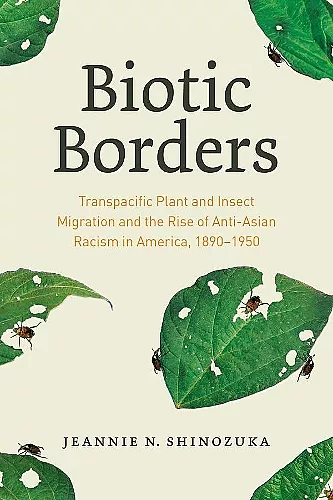Biotic Borders
Transpacific Plant and Insect Migration and the Rise of Anti-Asian Racism in America, 1890–1950
Format:Paperback
Publisher:The University of Chicago Press
Published:20th Apr '22
Should be back in stock very soon

A rich and eye-opening history of the mutual constitution of race and species in modern America.
In the late nineteenth century, increasing traffic of transpacific plants, insects, and peoples raised fears of a "biological yellow peril" when nursery stock and other agricultural products shipped from Japan to meet the growing demand for exotics in the United States. Over the next fifty years, these crossings transformed conceptions of race and migration, played a central role in the establishment of the US empire and its government agencies, and shaped the fields of horticulture, invasion biology, entomology, and plant pathology. In Biotic Borders, Jeannie N. Shinozuka uncovers the emergence of biological nativism that fueled American imperialism and spurred anti-Asian racism that remains with us today.
Shinozuka provides an eye-opening look at biotic exchanges that not only altered the lives of Japanese in America but transformed American society more broadly. She shows how the modern fixation on panic about foreign species created a linguistic and conceptual arsenal for anti-immigration movements that flourished in the early twentieth century. Xenophobia inspired concerns about biodiversity, prompting new categories of “native” and “invasive” species that defined groups as bio-invasions to be regulated—or annihilated. By highlighting these connections, Shinozuka shows us that this story cannot be told about humans alone—the plants and animals that crossed with them were central to Japanese American and Asian American history. The rise of economic entomology and plant pathology in concert with public health and anti-immigration movements demonstrate these entangled histories of xenophobia, racism, and species invasions.
“An eclectic work, far-ranging in its sites and examples.” * Pacific Affairs *
“Biotic Borders presents a uniquely fascinating ecological history and sociocultural analysis of the transmigration of Asian plants and insects during the period of American empire building in the late nineteenth and twentieth centuries, with a focus on the ‘mass migration of Japanese plant and insect immigrants.’ Shinozuka skillfully weaves together a historical analysis of anti-Asian racism and its relationship to research in the agricultural, environmental, and health sciences. . . . An important contribution to the history of American empire building, showing the ecological impacts of U.S. expansion in the Pacific region and highlighting Asian, Asian American, and Hawai‘ian perspectives.” * Isis *
“A significant work of historical scholarship. . . . This book is an excellent historical and definitive account of important topics, campaigns, peoples, and places. But the larger public and policy implications of her histories are what vaults this book into an essential primer for many audiences, both inside and outside academia.” * American Historical Review *
“This book will broaden the reader's understanding of botany, the nursery trade, and invasive species regulations while offering rare insights into the different historical figures and groups that have shaped the story. . . . Highly recommended.” * Choice *
"Biotic Borders provides a detailed, systematic analysis of how Asian immigrants became ensnarled historically with practices of pest control. This eye-opening work will be required reading for updated historical understandings about the relationship between biological science, racism, and nationalism." * Journal of the History of Biology *
"Biotic Borders is an ambitious study that successfully weaves together the stories of human and nonhuman migration and exclusion, all while telling a fascinating story of the rise of federal borders, bureaucracy, technocratic expertise, and quarantine practices." * History and Philosophy of the Life Sciences *
"An original, important, and exciting scholarly work. Shinozuka supports her thesis and its claims with abundant examples scoured from an extensive collection of archives. But this is no mere empirical study. Its strength is in Shinozuka's theoretical scaffolding, deftly concealed, that undergirds her reading of historical sources. The result is a compelling narrative that is informed by this theory, and that never loses the reader. This is a highly readable book with a powerful argument, and a story about the Japanese American experience that needs to be told." -- Vassiliki Betty Smocovitis, University of Florida
ISBN: 9780226817330
Dimensions: 229mm x 152mm x 20mm
Weight: 426g
304 pages